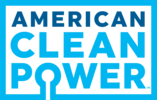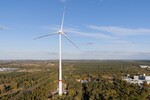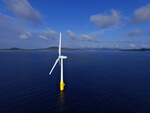News Release from American Clean Power Association (ACP)
Wind Industry Profile of
12/07/2011
This week: AWEA - Don't hit wind energy with job-killing tax hike
Congress should extend the renewable energy production tax credit (PTC) before the end of this year. Here is why:
First, American manufacturing jobs are coming back, with tens of thousands of new jobs from wind power. But these jobs could vanish if Congress allows the credit to expire, in effect enacting a targeted tax increase, crippling an American manufacturing success story and sending our jobs to foreign countries. With a job-killing tax increase on the horizon and the PTC's future uncertain, businesses are hesitant to plan future US wind farm projects, American manufacturers have seen a drop in orders, and layoffs have already started. For the purposes of the American wind turbines industry manufacturing sector, which needs lead time to make its products, the PTC effectively expires at the end of this year. To preserve tens of thousands of good-paying manufacturing jobs, the wind energy industry urgently needs Congress to take action to extend the PTC before the end of this calendar year.
Second, the PTC is a proven, effective tool to keep electricity rates low and encourage development of proven renewable energy projects. The past four years of stable tax policy demonstrate the economic security and energy diversity benefits that the wind power industry can continue to provide in a stable policy environment. During those four years, the wind turbines industry has grown at an annual rate of 37 percent. Today, over 400 facilities across 43 states manufacture for the wind energy industry, and 60 percent of a wind turbine’s value is now produced here in America, compared to 25% prior to 2005. Also, the price of American wind power has dropped by over 90% since 1980, benefiting utilities and consumers, and more than $60 billion of investment has been made since 2005.
Third, the PTC directly impacts American wind energy investment and project development. The wind turbines industry’s boom-and-bust cycle is evidence that the PTC affects project development. When it has been allowed to expire in the past, installations have dropped between 73% and 93%, with corresponding job losses.
Finally, the PTC is a performance-based business tax credit that is supported on a bipartisan basis. It applies only to actual electricity produced from utility-scale wind turbines--a wind farm project developer does not receive the credit until the wind turbine actually generates power. Because it is a business tax credit, funding is based solely on project performance, not evaluation by government officials. The PTC has been supported on a bipartisan basis in the past, and continues to receive support from both sides of the aisle.
For all of these reasons, Congress should extend the renewable energy Production Tax Credit now.
By Denise Bode, CEO, American Wind Energy Association, energy.nationaljournal.com/2011/12/should-congress-renew-cleanene.php#2128486
First, American manufacturing jobs are coming back, with tens of thousands of new jobs from wind power. But these jobs could vanish if Congress allows the credit to expire, in effect enacting a targeted tax increase, crippling an American manufacturing success story and sending our jobs to foreign countries. With a job-killing tax increase on the horizon and the PTC's future uncertain, businesses are hesitant to plan future US wind farm projects, American manufacturers have seen a drop in orders, and layoffs have already started. For the purposes of the American wind turbines industry manufacturing sector, which needs lead time to make its products, the PTC effectively expires at the end of this year. To preserve tens of thousands of good-paying manufacturing jobs, the wind energy industry urgently needs Congress to take action to extend the PTC before the end of this calendar year.
Second, the PTC is a proven, effective tool to keep electricity rates low and encourage development of proven renewable energy projects. The past four years of stable tax policy demonstrate the economic security and energy diversity benefits that the wind power industry can continue to provide in a stable policy environment. During those four years, the wind turbines industry has grown at an annual rate of 37 percent. Today, over 400 facilities across 43 states manufacture for the wind energy industry, and 60 percent of a wind turbine’s value is now produced here in America, compared to 25% prior to 2005. Also, the price of American wind power has dropped by over 90% since 1980, benefiting utilities and consumers, and more than $60 billion of investment has been made since 2005.
Third, the PTC directly impacts American wind energy investment and project development. The wind turbines industry’s boom-and-bust cycle is evidence that the PTC affects project development. When it has been allowed to expire in the past, installations have dropped between 73% and 93%, with corresponding job losses.
Finally, the PTC is a performance-based business tax credit that is supported on a bipartisan basis. It applies only to actual electricity produced from utility-scale wind turbines--a wind farm project developer does not receive the credit until the wind turbine actually generates power. Because it is a business tax credit, funding is based solely on project performance, not evaluation by government officials. The PTC has been supported on a bipartisan basis in the past, and continues to receive support from both sides of the aisle.
For all of these reasons, Congress should extend the renewable energy Production Tax Credit now.
By Denise Bode, CEO, American Wind Energy Association, energy.nationaljournal.com/2011/12/should-congress-renew-cleanene.php#2128486
- Source:
- American Wind Energy Association
- Author:
- Posted by Trevor Sievert, Online Editorial Journalist / By Denise Bode, www.awea.org/blog/
- Email:
- windmail@awea.org
- Link:
- www.awea.org/...
- Keywords:
- awea, wind, wind energy, wind turbine, rotorblade, awea, ewea, wind power, suppliers, manufacturers, renewable energy, trevor sievert



























